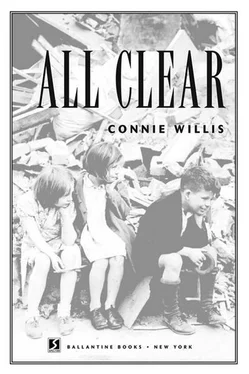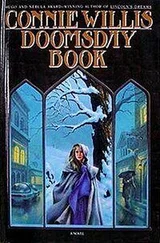Connie Willis - All Clear
Здесь есть возможность читать онлайн «Connie Willis - All Clear» весь текст электронной книги совершенно бесплатно (целиком полную версию без сокращений). В некоторых случаях можно слушать аудио, скачать через торрент в формате fb2 и присутствует краткое содержание. Жанр: Старинная литература, на английском языке. Описание произведения, (предисловие) а так же отзывы посетителей доступны на портале библиотеки ЛибКат.
- Название:All Clear
- Автор:
- Жанр:
- Год:неизвестен
- ISBN:нет данных
- Рейтинг книги:5 / 5. Голосов: 1
-
Избранное:Добавить в избранное
- Отзывы:
-
Ваша оценка:
- 100
- 1
- 2
- 3
- 4
- 5
All Clear: краткое содержание, описание и аннотация
Предлагаем к чтению аннотацию, описание, краткое содержание или предисловие (зависит от того, что написал сам автор книги «All Clear»). Если вы не нашли необходимую информацию о книге — напишите в комментариях, мы постараемся отыскать её.
All Clear — читать онлайн бесплатно полную книгу (весь текст) целиком
Ниже представлен текст книги, разбитый по страницам. Система сохранения места последней прочитанной страницы, позволяет с удобством читать онлайн бесплатно книгу «All Clear», без необходимости каждый раз заново искать на чём Вы остановились. Поставьте закладку, и сможете в любой момент перейти на страницу, на которой закончили чтение.
Интервал:
Закладка:
I’ll have to get to a phone somehow, he thought. I’ll tell Cess it’s too late to deliver my write-ups to Mr. Jeppers tonight, that the Call’s office will be shut, and find a way to take them over alone tomorrow.
But that’ll mean my messages won’t get in till at least week after next, he thought, and realized it no longer mattered.
You don’t need to send any more messages, he thought jubilantly. You’ve found Atherton! All you’ve got to do is get to London without von Sprecht realizing he’s been duped and hand him over to the War Ministry.
And even that proved simple. The colonel’s feigned slumber turned into the real thing, and Ernest took advantage of his sleeping and Cess’s—he’d fallen asleep against the door, his mouth open—to speed through Kingston and Guildford and across the southern edge of London so they could approach the city the way they would have if they’d really been coming from Dover. That way they wouldn’t have to worry about a glimpse of St. Paul’s in the wrong spot ruining the entire illusion.
They were both still asleep when he turned north onto the Old Kent Road. Home free, he thought. Now all we have to do is deliver the colonel to the authorities and—
Cess woke up. “Where are we?” he asked sleepily, and then said, “I think I hear a knock in the engine.”
Oh, God, what now? He glanced back at the colonel, but he was still asleep, and Ernest could see his chest moving, so he hadn’t died.
“There’s a garage ahead,” Cess said, pointing.
Ernest pulled in to it and stopped the car, and they both got out. “What’s wrong?” he whispered as soon as he had the hood up.
“Nothing. I need to look at the map. Where are we?”
“On the Old Kent Road. What do you need the map for? This’ll take us straight to Whitehall and the War Ministry.”
“We’re not taking him to the War Ministry,” Cess said. “They’re having a state dinner for him. With General Patton. To put the finishing touches on.” And after a minute he added, “Oh, good, we can take the same route in as I do when I deliver my press releases. Look”—Cess showed Ernest the map—“we take this to the Holborn Viaduct and then the Bayswater Road to Kensington—”
Kensington? Jesus. “Where’s this dinner being held?”
“Kensington Palace. It’s at the western end of Kensington Gardens. Just before Notting Hill Gate.”
Just waiting, waiting, waiting till your number came up …
—WAR CORRESPONDENT IN A
HOLDING CAMP BEFORE D-DAY
London—Spring 1941
TWO OF MRS. RICKETT’S OTHER BOARDERS WHO’D DECIDED to stay at home that night had been killed along with her. The bomb, a five-hundred-pound HE, had hit several minutes before three. The raids had been fairly heavy early in the evening (as Polly knew—she’d had to shout over the bombs during ENSA’s evening performance) and then tapered off. By midnight, it had looked like the Germans were done for the night, and at half past two, Mrs. Rickett had announced she was going home to sleep in her own bed, but she hadn’t made it. She’d been killed on her doorstep, by flying glass.
Luckily Miss Laburnum and Miss Hibbard hadn’t gone with her—they were arguing with Mr. Dorming and the rest of the troupe over whether to do a dramatic reading from A Kiss for Cinderella or from Dear Brutus.
Polly had spent far more time with them than with Mrs. Rickett, and yet the wounded, flailing continuum had still killed her. So what chance did the troupe or Marjorie or Mr. Humphreys have? Or Hattie and the rest of the ENSA cast, with whom she had to be in contact every day and who were all friendly and eager to show her the ropes?
You don’t want to have anything to do with me, Polly wanted to scream at them. The continuum’s going to vainly keep on trying to correct itself, and next time it will get me and all of you.
But there was no avoiding them. The entire cast and crew were onstage together every afternoon rehearsing and in the crowded wings every night, and the girls shared a single dressing room.
Polly did the best she could. She came in early to do her makeup, turned down all offers to go out for a drink or supper afterward, and spent most of her time backstage “with her nose in a book,” which she’d borrowed from the shelter library at Leicester Square—not Holborn, where the ginger-haired librarian who’d been so kind to her worked.
The book was a mystery by Agatha Christie. “You’ll never guess the ending,” Hattie said, and she didn’t. She stared blindly at the pages and thought about losing the war and Mr. Dunworthy’s deadline and all the innocent people she might be responsible for killing—the ones Stephen Lang’s tipped V-1s had landed on, the customers who’d had to wait till she’d fumbled to wrap their purchases and consequently been late getting to the shelter, the soldiers, many of them no older than Colin, who hung about the stage door waiting for her to come out and were caught by their commanding officer sneaking in late and punished by being shipped off to North Africa or the North Atlantic.
But making the soldiers late back to camp was safer for them than going out with them, and she was far more worried about the cast, with whom she still had far too much contact. ENSA mounted a new production every fortnight, so they were perpetually in rehearsal.
When Polly arrived they’d been doing ENSA Stirs the Pudding. The following week, ENSA Pulls the Crackers opened, and a fortnight later, ENSA Springs Toward Victory, though Polly had difficulty telling them apart. They all consisted of patriotic songs, chorus lines, comedians, and assorted war-related skits.
Polly played, in rapid succession and very short skirts, an anti-aircraft gunner, a gum-chewing American WAC, a debutante in a munitions factory (complete with tiara, ball gown, and spanner), and a girl saying goodbye to a soldier in a railway station.
“But I’m being shipped out,” Reggie, in a BEF uniform, said, attempting to put his arm around her. “Can’t you give me just one tiny kiss?”
Polly shook her head coyly, and he stuck his hand out for her to shake. She looked at it, then at the audience (who were shouting, “Aw, come on, give him a kiss!”
and making loud smooching noises), then grabbed his hand, swung him into a dip, and planted a torrid kiss on him.
“Zowee!” he said, doing a double take. “I thought you said you wouldn’t kiss me goodbye.”
“I did, but then I remembered Mr. Churchill said we must do everything we can for the war effort.”
“And that was what you were doing?”
“No,” she said and batted her eyes. “But it’s everything I can do in a railway station.”
It was also her job to come out on the stage in a very short skirt when the sirens sounded, turn her back to the audience, bend over, and flip up the back of her skirt to reveal satin bloomers on which were sewn red flannel letters spelling out, “Air Raid in Progress.”
The bit was wildly popular, and by the end of her fifth week with ENSA, Mr. Tabbitt had put her photograph (smiling, hands on hips, not bent over) with the caption “Air Raid Adelaide” up on the display board at the lobby entrance and told her glumly that ENSA’s head wanted her to go on tour to the RAF’s airfields starting the third week of April.
“It’s more money,” he said. “And you’ll have top billing.” And it would get her away from Eileen and Alf and Binnie, whom she still held out hope might survive.
But Hattie, who had never done her any harm, had already agreed to the tour, and they would have to share a room and spend hours on crowded buses together, so Polly turned it down.
“Oh, marvelous,” Mr. Tabbitt said, and the next night had her put on her Air Raid Adelaide costume and went out in front of the curtain. “I have an official announcement,” he said. “If the Luftwaffe attacks tonight, the ‘Air Raid in Progress’ notice will be displayed.”
Читать дальшеИнтервал:
Закладка:
Похожие книги на «All Clear»
Представляем Вашему вниманию похожие книги на «All Clear» списком для выбора. Мы отобрали схожую по названию и смыслу литературу в надежде предоставить читателям больше вариантов отыскать новые, интересные, ещё непрочитанные произведения.
Обсуждение, отзывы о книге «All Clear» и просто собственные мнения читателей. Оставьте ваши комментарии, напишите, что Вы думаете о произведении, его смысле или главных героях. Укажите что конкретно понравилось, а что нет, и почему Вы так считаете.












